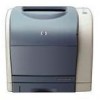HP 2500 HP PCL/PJL reference - Printer Job Language Technical Reference Manual - Page 281
HP LaserJet 4000 and 5000 Series Comments, I/O Buffer Variables
 |
View all HP 2500 manuals
Add to My Manuals
Save this manual to your list of manuals |
Page 281 highlights
HP LaserJet 4000 and 5000 Series Comments The LaserJet 4000 and 5000 series printers have a PJL feature set similar to the LaserJet 5Si/5SiMx printers. Listed below are some of the differences between the printers. In addition to the LaserJet 5Si/5SiMx printer features, the LaserJet 4000 and 5000 series printers have: • 1200 dpi print resolution • Support for the Czechoslovakian, Hungarian, and Russian languages • Support for slightly different paper sizes • More Resolution Enhancement technology (REt) settings • Support for the CLEARABLEWARNINGS, COURIER, MPTRAY, REPRINT, and WIDEA4 environment variables I/O Buffer Variables Reconfiguring the size of the LaserJet 4000 and 5000 series I/O buffers via the data stream can be difficult. The user may try to send data to the printer while the I/O buffers are being reconfigured, which results in the data being consumed until the reconfiguration is complete. While it is not anticipated that these commands will be used often, it is expected that they will be used at least occasionally. For this reason, a special communication sequence has been proposed between the printer and this software, so that the I/O buffers may be reconfigured via the data stream without I/O being lost. The following sequence assumes that the printer is idle. Any I/O being sent by other users will be lost. 1 The software sends the job which includes a PJL command changing the configuration of the I/O buffers. 2 The software also sends an @PJL ECHO command at the end of the job, followed by a UEL command. 3 The printer sends the echo command back to the host. 4 After the end of the job, the printer goes offline and reconfigures the I/O buffers. EN Product-Specific Feature Support A-59















